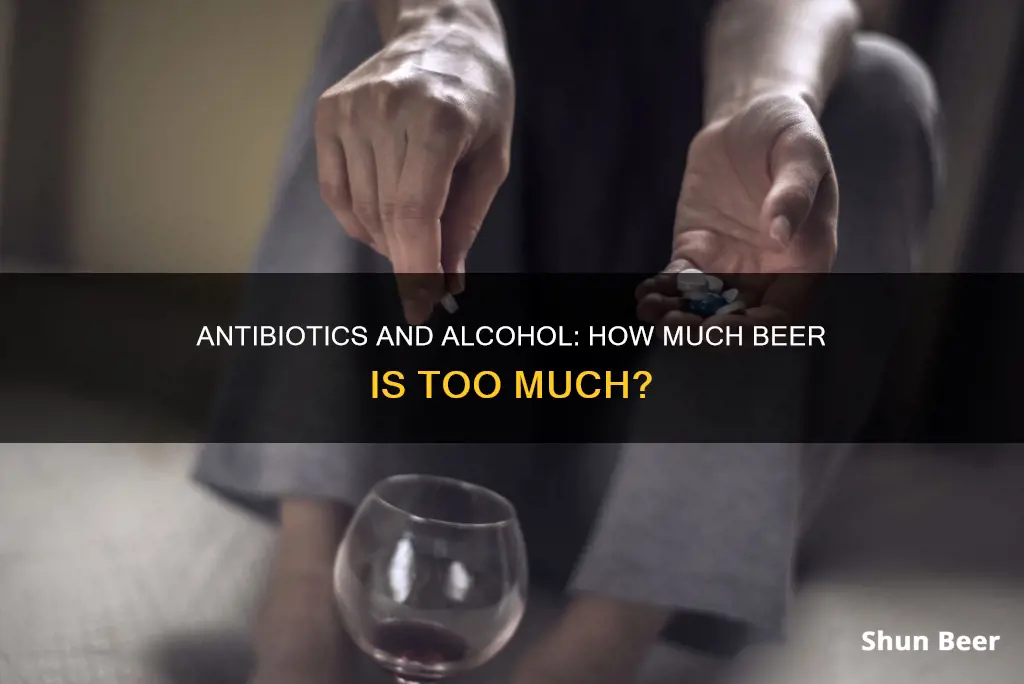
It's a common question: can you drink alcohol while taking antibiotics? The answer isn't straightforward, but it's generally advised to avoid it. While moderate alcohol consumption doesn't usually affect the effectiveness of antibiotics, it can reduce your energy and delay your recovery. Alcohol can also increase the likelihood of certain side effects, such as digestive issues and drowsiness, and can cause dehydration and sleep disruption.
Some antibiotics, such as Metronidazole and Tinidazole, can have more severe interactions with alcohol, causing extreme nausea and vomiting. It's always best to check with your doctor or pharmacist about the specific antibiotic you're taking, as they can advise based on your health and the type of drug.
| Characteristics | Values |
|---|---|
| Amount of beer that can be consumed with antibiotics | For most antibiotics, one drink for women and two drinks for men is considered moderate drinking and is fine. |
| Exceptions | Metronidazole, tinidazole, cefoperazone, cefotetan, ketoconazole, isoniazid, linezolid, doxycycline, and erythromycin should not be consumed with alcohol. |
| Side effects | Nausea, vomiting, stomach pain, flushing, liver damage, drowsiness, dizziness, digestive issues, decreased effectiveness of antibiotics, dehydration, interrupted sleep, lower immune response, and delayed recovery. |
| Waiting period | There is no waiting period for most antibiotics. For metronidazole and tinidazole, it is recommended to wait for at least 72 hours after the last dose. |
What You'll Learn
- Beer and antibiotics can cause side effects like nausea and vomiting
- Drinking alcohol while on antibiotics can slow your recovery
- Mixing antibiotics and alcohol can cause a dangerous reaction
- Alcohol can hinder your body's ability to absorb antibiotics
- Drinking alcohol can lead to dehydration and a weakened immune system

Beer and antibiotics can cause side effects like nausea and vomiting
Drinking beer while taking antibiotics can have adverse effects on your health. While moderate alcohol consumption doesn't usually reduce the effectiveness of antibiotics or cause serious interactions, it can still hinder your recovery. Alcohol can reduce your energy and delay your recovery, so it's best to avoid it while on antibiotics.
Drinking alcohol while taking certain antibiotics can also cause a potentially dangerous reaction. For example, drinking alcohol while taking metronidazole, tinidazole, cefoperazone, cefotetan, or ketoconazole can cause a "disulfiram-like reaction", leading to symptoms such as nausea, vomiting, stomach cramps, and flushing of the skin. Similar but less severe symptoms can occur when drinking alcohol with other antibiotics such as Bactrim®, a sulfa antibiotic containing sulfamethoxazole and trimethoprim.
In addition, alcohol can worsen common side effects of antibiotics, such as stomach problems, including nausea, vomiting, diarrhea, and stomach pain. It can also disrupt your sleep patterns and interfere with your body's ability to absorb vital nutrients, which can further delay your recovery from illness.
Therefore, it is generally recommended to avoid drinking beer or any other form of alcohol while taking antibiotics. If you are unsure, always consult your doctor or pharmacist for advice regarding alcohol consumption during your antibiotic treatment.
Anesthesia and Alcohol: Safe to Drink Beer Post-Procedure?
You may want to see also

Drinking alcohol while on antibiotics can slow your recovery
Drinking alcohol while taking antibiotics is generally not recommended, as it can hinder your recovery process in several ways. Firstly, alcohol can dehydrate you, disrupt your sleep, and lower your immune response, all of which can delay your recovery from illness.
Secondly, alcohol may interact with certain antibiotics, leading to unpleasant and sometimes dangerous side effects. For example, antibiotics such as metronidazole and tinidazole can cause dizziness, drowsiness, nausea, and other symptoms when combined with alcohol. These reactions can be severe and require medical attention.
Additionally, alcohol can interfere with your body's ability to absorb some antibiotics, reducing their effectiveness. This interference can also increase the risk of developing side effects and hinder your body's natural healing process.
To ensure a safe and speedy recovery, it is best to abstain from alcohol until you have completed your course of antibiotics. Discuss any concerns with your doctor or pharmacist, who can advise based on your specific antibiotic, health status, and individual needs.
Wine, Beer, and Mixing Drinks: What's the Verdict?
You may want to see also

Mixing antibiotics and alcohol can cause a dangerous reaction
Mixing antibiotics and alcohol can cause a range of negative side effects and may even be dangerous. While moderate alcohol consumption doesn't usually reduce the effectiveness of most antibiotics, it can still hinder your recovery by reducing your energy levels and disrupting your sleep. It can also cause dehydration, an upset stomach, and lower your immune response.
Some antibiotics, such as metronidazole (Flagyl®) and tinidazole (Tindamax®), can have extreme reactions when mixed with alcohol. These reactions can include nausea, vomiting, skin flushing, stomach cramps, and difficulty breathing. It is recommended to completely avoid alcohol when taking these antibiotics and for at least 72 hours after finishing the course.
Other antibiotics that can have negative interactions with alcohol include isoniazid, linezolid, doxycycline, and erythromycin. These combinations may make the antibiotics less effective or increase the risk of certain side effects.
It is always best to consult with your doctor or pharmacist before mixing alcohol with any medication, including antibiotics. They can advise you on the specific risks and whether it is safe to consume alcohol during or after your course of antibiotics.
Beer for Breakfast: Colonists' Morning Beverage of Choice
You may want to see also

Alcohol can hinder your body's ability to absorb antibiotics
How alcohol affects recovery
Alcohol can have many negative effects on your health, including your liver function, digestion, and heart health. Drinking excessively can also weaken your immune system, making it easier to pick up contagious illnesses.
If you're already unwell, drinking alcohol can slow down your recovery. Dehydration and poor sleep are the main side effects of alcohol that can slow your recovery.
Antibiotics and alcohol interactions
Healthcare providers write over 200 million antibiotic prescriptions every year, according to the U.S. Centers for Disease Control and Prevention (CDC). That's 6 prescriptions for every 10 people. While these medications are not always appropriate, they are effective for treating certain infections.
Most antibiotics don't interact with alcohol, but there are a few exceptions. For example, drinking alcohol while taking Metronidazole (Flagyl®) or Tinidazole (Tindamax®) can cause extreme nausea and vomiting. Similar but less severe symptoms can occur with Bactrim®, a sulfa antibiotic.
If you're taking Metronidazole or Tinidazole, even one drink is not safe. Stay away from all alcohol, even the small amounts found in some mouthwashes and cold medicines.
For other antibiotics, it's best to hold off until you're feeling better. Getting enough rest and eating a nutritious diet help you recover from sickness or infection, and drinking alcohol can interfere with these factors.
There's no waiting period to drink alcohol after taking most antibiotics. But for Metronidazole or Tinidazole, it's recommended to wait at least 72 hours after your last dose before consuming any alcohol.
If you're healthy, moderate alcohol use shouldn't affect how well an antibiotic works. However, alcohol can increase your chance of experiencing certain side effects, especially if you drink too much.
Drinking alcohol while taking antibiotics like Doxycycline and Erythromycin may make them less effective. Alcohol can also cause the antibiotic to be broken down more quickly in the body, which can lead to antibiotic resistance.
Beer and Promethazine: Safe Mix or Health Risk?
You may want to see also

Drinking alcohol can lead to dehydration and a weakened immune system
Drinking alcohol can have several negative impacts on your body, and when you're taking antibiotics, these effects can be heightened. Alcohol is known to contribute to dehydration, which can irritate the bladder and increase the urge to urinate. This can be particularly problematic for those with urinary tract infections (UTIs), as it can worsen symptoms and make the infection more uncomfortable.
Alcohol also inhibits the release of an anti-diuretic hormone, which helps the body retain water. As a result, excessive alcohol intake can lead to increased urine output and subsequent fluid loss. This can be counterproductive when trying to manage UTI symptoms, as staying hydrated is crucial to alleviate discomfort.
Additionally, alcohol consumption can weaken the immune system, making it harder for your body to fight off infections. This includes UTIs, as a weakened immune system can prolong the duration of the infection or increase the likelihood of recurrence. It is important to prioritize immune system support when dealing with any infection, and consuming alcohol may hinder the body's natural ability to defend against bacteria.
The effects of alcohol on the body can vary depending on the amount consumed, with excessive alcohol intake leading to more severe consequences. However, even moderate alcohol consumption can have an impact when combined with antibiotics. It is always advisable to exercise caution and consider reducing or abstaining from alcohol while taking antibiotics to support your body's healing process and allow your immune system to function optimally.
Beer and Vinegar: A Safe Mix?
You may want to see also
Frequently asked questions
It is not recommended to drink beer or any other form of alcohol while on antibiotics. Even a little alcohol can slow down your recovery from illness and cause a variety of side effects.
The side effects of drinking alcohol while on antibiotics include digestive issues, drowsiness, dizziness, nausea, headache, flushing, chest and abdominal discomfort, and more.
You should never consume alcohol while taking the following antibiotics: Metronidazole, Tinidazole, Cefoperazone, Cefotetan, and Ketoconazole.







